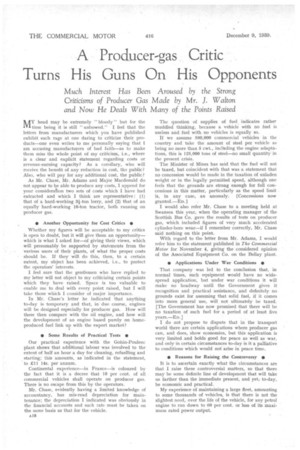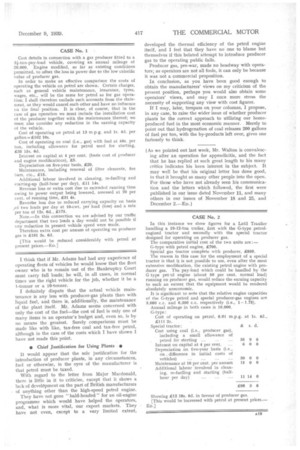A Producer-gas Critic Turns His Guns On His Opponents
Page 20

Page 21

If you've noticed an error in this article please click here to report it so we can fix it.
Much Interest Has Been Aroused by the Strong Criticisms of Producer Gas Made by Mr. J. Walton and Now He Deals With Many of the Points Raised
NiTY head may be extremely " bloody" but for the VA time being it is still "unbowed." I feel that the letters from manufacturers which you have published exhibit such rage at one daring to criticize their products—one even writes to me personally saying that I am accusing manufacturers of bad faith—as to make them miss the whole point of my criticism, i.e., where is a clear and explicit statement regarding costs or revenue-earning capacity? As a corollary, who will receive the benefit of any reduction in cost, the public? Also, who will pay for any additional cost, the public?
As Mr. Chase, Mr. Adams and Major Macdonald do not appear to be able to produce any costs, I append for your consideration two sets of costs which I have had extracted and which I think are representative ; (1) that of a hard-working 31-ton lorry, and (2) that of an equally hard-working 10-ton tractor, both running on producer gas.
• Another Opportunity for Cost Critics • Whether my figures will be acceptable to my critics is open to doubt, but it will give them an opportunity— which is what I asked for—of giving their views, which will presumably be supported by statements from the various users of their plants, of what the proper costs should be. If they will do this, then, to a certain extent, my object has been achieved, i.e., to protect the operators' interests.
I feel sure that the gentlemen who have replied to my letter will not object to my criticizing certain points which they have raised. Space is too valuable to enable me to deal with every point raised, but I will take those which I consider of major importance.
In Mr. Chase's letter he indicated that anything to-day is temporary and that, in due course, engines will be designed especially for producer gas. How will these then compare with the oil engine, and how will the development of an engine based purely on homeproduced fuel link up with the export market?
• Some Results of Practical Tests • Our practical experience with the Gohin-Poulenc plant shows that additional labour was involved to the extent of half an hour a day for cleaning, refuelling and starting; this amounts, as indicated in the statement, to £11 14s, per annum.
Continental experience—in France—is coloured by the fact that it is a decree that 10 per cent. of all commercial vehicles shall operate on producer gas. There is no escape from this by the operators.
Mr. Chase, evidently having a limited knowledge of accountancy, has mis-read depreciation for maintenance; the depreciation I indicated was obviously in the financial accounts and such rate must be taken on the same basis as that for the vehicle.
A18
The question of supplies of fuel, indicates rather muddled thinking, because a vehicle with no fuel is useless and fuel with no vehicles is equally so.
If we assume 500,000 commercial vehicles in the country and take the amount of steel pea vehicle as being no more than 5 cwt., inclhding the engine adaptations, this is 125,000 tons of steel—no small quantity in the present crisis.
The Minister of Mines has said that the fuel will not be taxed, but coincident with that was a statement that no concession would be made in the taxation of unladen weight or in the legally permitted speed, although one feels that the grounds are strong enough for full concessions in this matter, particularly as the speed limit is, in any case, an anomaly. [Concessions now granted.—En.] I would also refer Mr. Chase to a meeting held at Swansea this year, when the operating manager of the Scottish Bus Co. gave the results of tests on producer gas, which included figures of very much accelerated cylinder-bore wear—if I remember correctly, Mr. Chase said nothing on this point.
With regard to the letter from Mr. Adams, I would refer him to the statement published in The Commercial Motor for November 4, giving the considered opinion of the Associated Equipment Co. on the Bellay plant.
• Applications Under War Conditions •
That company was led to the conclusion that, in normal times, such equipment would have no widespread application, but under war conditions it will make no headway until the Government gives it recognition and practical assistance, and definitely no grounds exist for assuming that solid fuel, if it comes into more general use, will not ultimately be taxed. [The Government has now promised that there will be no taxation of such fuel for a period of at least five years.—En.] I do not propose to dispute that in the transport world there are certain applications where producer gas can, and does, show economies, but this application is very limited and holds good for peace as well as war, and only in certain circumstances to-day is it a palliative to conditions which would not arise in peace time.
• Reasons for Raising the Controversy • It is to ascertain exactly what the circumstances are that I raise these controversial matters, so that there may be some definite line of development that will take us farther than the immediate present, and yet.' to-day, be economic and practical.
My experience of maintaining a large fleet, amounting to some thousands of vehicles, is that there is not the slightest need, over the life of the vehicle, for any petrol engine to run down to 60 per cent, or less of its maximum rated power output.
Cost details in connection with a gas producer fitted to a 3i-ton-pay-load vehicle, covering an annual mileage of 20,000. Engine modified, so far as existing conditions permitted, to offset the loss in power due to the low calorific value of producer gas.
In order to make an effective comparison the costs of operating the vehicle on petrol are shown. Certain charges, such as general vehicle maintenance, insurance, tyres, wages, etc., will be the same for petrol as for gas operation; I shall therefore exclude such accounts from the statement, as they would cancel each other and have no influence on the final position. It is clear, of course, that in the case of gas operation we must include the installation cost of the producer together with the maintenance thereof; we must also consider any reduction in the earning capacity of the vehicle.
Cost of operating on petrol at 13 m.p.g. and Is. 4d. per gallon= £102 10s.
Cost of operating on coal (i.e., gas) with fuel at 465. per ton, including allowance for petrol used for starting, £35 15s. 6d.
Interest on capital at 4 per cent. (basis cost of producer and engine modifications), £5.
Depreciation on five-year basis, £20.
Maintenance, including renewal of filter elements, fire bars, etc., £15.
Additional labour involved in cleaning, re-fuelling and starting-up (half-hour per day), £11 14s. Revenue loss or extra cost due to extended running time owing to power output being lowered, assessed at 20 per cent, of running time, £31 4s. Revente loss due to reduced carrying capacity on basis of two loads per day at 10-cwt. per load (loss) and a rate per ton of 12s. 6d., £175. Note.—In this connection we are advised by our traffic department that two loads a day would not be possible if any reduction in present vehicle speed were made. Therefore extra cost per annum of operating on producer gas is £191 3s. 6d.
[This would be reduced considerably with petrol at present prices.—En.] I think that if Mr. Adams had had any experience of operating fleets of vehicles he would know that the fleet owner who is to remain out of the Bankruptcy Court must carry full loads; he will, in all cases, in normal times use the right vehicle for the job, whether it be a 1-tanner or a 10-tonner.
I definitely dispute that the actual vehicle maintenance is any less with producer-gas plants than with liquid fuel, and there is, additionally, the maintenance of the plant itself. Mr. Adams seems concerned with only the cost of the fuel—the cost of fuel is only one of many items in an operator's budget and, even so, is by no means the greatest. Surely comparisons must be made like with like, tax-free coal and tax-free petrol, although in the case of the costs. which I have shown I have not made this point.
• Chief Justification for Using Plants •
It would appear that the sole justification for the introduction of producer plants, in any circumstances, fuel or otherwise, in the eyes of the manufacturer is that petrol must be taxed.
With regard to the letter from Major Macdonald, there is little in it to criticize, except that it shows a lack of develdpment on the part of British manufacturers of anything other than the high-speed petrol engine. They have not gone " bald-headed" for an oil-engine programme which would have helped the operators, and, what is more vital, our export markets. They have not even, except to a very limited extent,
developed the thermal efficiency of the petrol engine itself, and I feel that they have no one to blame but themselves if this belated attempt to introduce producer gas to the operating public fails.
Producer gas, pre-war, made no headway with operators; as operators are not all fools, it can only be because it was not a commercial proposition.
In conclusion, as you have been good enough to obtain the manufacturers' views on my criticism of the present position, perhaps you would also obtain some operators' views, and may I once more stress the necessity of supporting any view with cost figures.
If I may, later, trespass on your columns, I propose, in any case, to raise the wider issue of whether producer plants be the correct approach to utilizing our homeproduced fuel in the most economic manner. Merely to point out that hydrogenation of coal releases 200 gallons of fuel per ton, with the by-products left over, gives one furiously to think.
(As we pointed out last week, Mr. Walton is convalescing after an operation for appendicitis, and the fact that he has replied at such great length to his many critics indicates his keen interest in the subject. It may well be that his original letter has done good, in that it brought so many other people into the open. For those who have not already seen his communication and the letters which followed, the first were published in our issue dated November 11, and many others in our issues of November 18 and 25, and December 2.—En.] In this instance we show figures for a Latil Traulier handling a 10-12-ton trailer, first with the G-type petrolengined tractor and secondly with the special tractor designed for operating on producer gas.
The comparative initial cost of the two units are:— G-type with petrol engine, 4700.
Special gas tractor complete with producer, £850.
The reason in this case for the employment of a special tractor is that it is not possible to use, even after the most extensive modification, the existing petrol engine with producer gas. The pay-load which could be handled by the G type pet--ol engine (about 50 per cent, normal load) running on producer gas, would reduce the earning capacity to such an extent that the equipment would be rendered absolutely uneconomic.
It is significant to note that the relative engine capacities of the G-type petrol and special producer-gas engines are 3,680 c.c. and 6,350 c.c. respectively (i.e., I —1.75).
Annual mileage in both cases is 10,000.
G-type :
Cost of operating on petrol, 6.01 m.p.g. at Is. 9d.,




















































